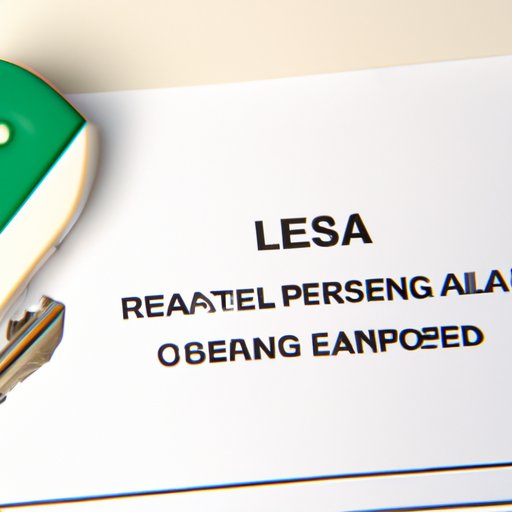
Introduction
Breaking a lease can happen for a number of reasons, but regardless of the circumstances, it’s important to understand the consequences of doing so. Whether it’s a job transfer, financial trouble, or a personal situation that requires you to move, breaking a lease can have significant implications. In this article, we’ll explore what happens when you break a lease, how to avoid costly mistakes, and what steps you can take to protect your rights as a tenant.
The Consequences of Breaking a Lease: What You Need to Know
Breaking a lease means terminating a rental agreement before the agreed-upon end date. This can have a number of consequences, both financial and legal, that renters should be aware of. Depending on the terms of your lease and the state you live in, the consequences of breaking a lease can include:
- Loss of security deposit
- Additional fees or penalties
- Lawsuits and legal action from the landlord
- Negative impact on credit score
- Difficulty securing future rental agreements
It’s important to review your lease agreement carefully before making any decisions to break your lease. Most lease agreements have clauses that address the obligations of both parties in the event of a lease break, and understanding these terms can help you avoid financial and legal trouble down the line.
Breaking Your Lease: How to Avoid Costly Mistakes
Breaking a lease can be a costly endeavor, but there are steps you can take to minimize the financial impact. Some tips to consider include:
- Discuss your situation with your landlord and explore alternative options (such as subletting or finding a replacement tenant)
- Review your lease agreement carefully to understand the terms and obligations associated with a lease break
- Plan ahead and provide your landlord with as much notice as possible
- Consider hiring a lawyer to help you navigate the process
It’s important to remember that breaking a lease is not the only option available to renters. Depending on your situation, you may be able to negotiate a lease extension, sublet your apartment, or find a replacement tenant. By exploring these options before deciding to break your lease, you may be able to avoid costly penalties and fees.
A Step-by-Step Guide to Breaking Your Lease Without Breaking the Bank
If you do decide to break your lease, there are steps you can take to make the process go as smoothly as possible. Here’s a step-by-step guide to consider:
- Review your lease agreement carefully to understand the financial and legal obligations associated with a lease break
- Notify your landlord of your intent to break the lease as soon as possible
- Consider negotiating with your landlord to reach a mutually beneficial agreement
- Find a replacement tenant or subletter, if possible
- Prepare your apartment for move-out and schedule a final walk-through with your landlord
- Complete any necessary paperwork (such as a lease termination agreement)
- Ensure that all outstanding rent and fees are paid in full
- Return the keys and any other property belonging to the landlord
It’s important to keep in mind that breaking a lease can have legal consequences, so it’s important to take every step necessary to protect your rights as a tenant.
The Legal Ramifications of Breaking Your Lease: Understanding Your Rights as a Tenant
As a tenant, you have certain rights when it comes to breaking a lease. Depending on the state you live in and the terms of your lease, these rights may include:
- The right to give notice of lease termination
- The right to negotiate with your landlord
- The right to find a replacement tenant or subletter
- The right to dispute any fines or penalties imposed by the landlord
- The right to take legal action if your rights have been violated
If you’re considering breaking your lease, it’s important to familiarize yourself with your rights as a tenant. Understanding these rights can help you negotiate with your landlord and protect yourself from unnecessary financial and legal consequences.
Breaking a Lease: What Landlords Can and Can’t Do When You Walk Away
When you break a lease, your landlord has certain obligations and limitations that they must adhere to. For example, landlords are generally prohibited from:
- Withholding your security deposit without justification
- Levying unreasonable fees or penalties
- Taking retaliatory action against you (such as filing a lawsuit or eviction notice) without cause
- Denying you access to the property before the end of the lease term
It’s important to review your lease agreement and state laws to understand your landlord’s obligations and limitations. By doing so, you can take steps to protect yourself if your landlord tries to take advantage of the situation.
Conclusion
Breaking a lease can be a difficult decision, but it’s important to weigh the potential consequences before making a move. By understanding your lease agreement, exploring alternative options, and familiarizing yourself with your rights as a tenant, you can minimize the financial and legal impact of breaking your lease. If you’re unsure about what steps to take, it’s always a good idea to seek out the help of a legal professional.




